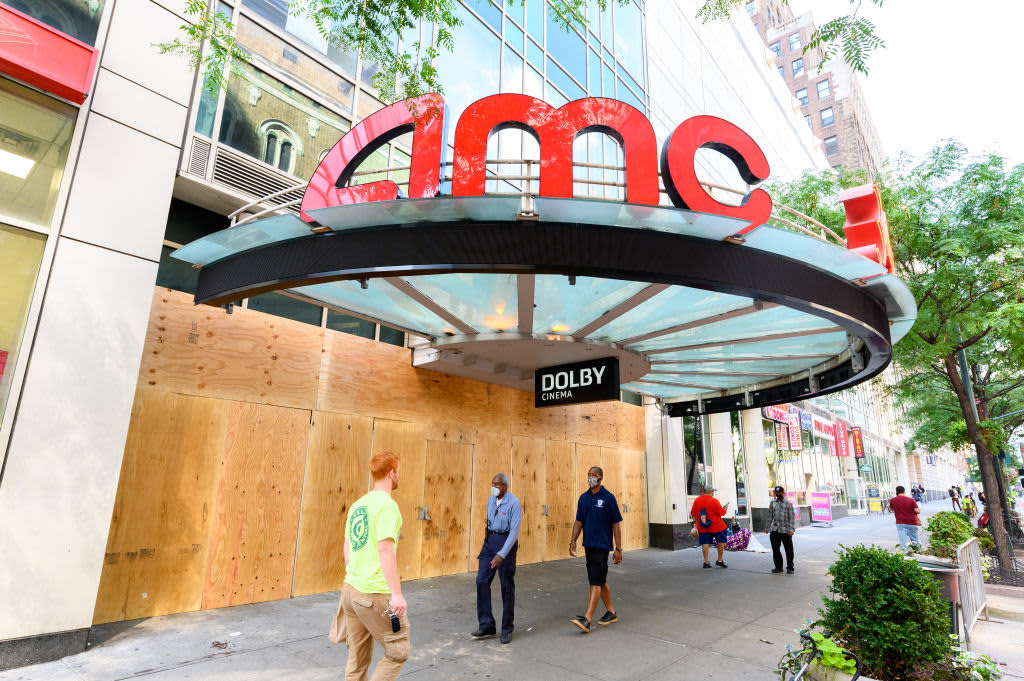AMC warns it could run out of cash this year

People walk outside the newly boarded AMC 34th Street 14 movie theater as the city continues Phase 4 of re-opening following restrictions imposed to slow the spread of coronavirus on September 4, 2020 in New York City.
Noam Galai | Getty Images
AMC, the largest cinema chain in the U.S., warned investors on Tuesday is in danger of running out of cash by early 2021.
Shares of the company tanked by 7.8% in early trading Tuesday. AMC’s stock, which has a market value of $446 million, has plunged 44% this year.
In a public filing, the movie exhibitor said a bare movie slate and lackluster attendance has left its business hemorrhaging cash with little hope of recouping losses in the near future.
As of Friday, AMC said, has been able to reopen 494 of its 598 U.S. theaters, but only at a limited capacity of 20% to 40%. The remaining theaters are in California, Maryland, New York, North Carolina and Washington. These theaters, although only around 17% of the company’s total footprint, represented nearly a fourth of the company’s total revenue last year.
For now, there are only four major films on the slate for the rest of the year: Universal’s “The Croods: A New Age,” Disney’s “Free Guy,” Paramount Pictures’ “Coming 2 America” and Warner Bros.’ “Wonder Woman 1984.”
And even their release dates could change as coronavirus case numbers continue to rise and some states remain stringent about keeping movie theaters shuttered.
Over the past seven days, the U.S. has been adding about 50,000 new coronavirus cases a day, which is up nearly 13% from a week ago. Public health officials anticipate the virus could spread more rapidly as the weather gets colder and people begin to spend more time indoors.
AMC said it is in talks with local and state government officials from these states, but there is no clear timing for when these locations will be able to reopen.
California has loosened restrictions on movie theaters, but only around 139 of the state’s more than 500 cinemas are open. New York’s guidelines have remained firmly against theaters reopening. As of last weekend, only two of New York’s nearly 300 locations were open.
Cinema owners have rallied together to try to pressure New York, in particular, to permit theaters to reopen. Studios have made it clear to these operators that if the state does not reopen, major blockbusters will continue to be delayed.
AMC has already renegotiated its debt to improve its balance sheet this year and is exploring several ways of acquiring additional sources of liquidity and ways to increase attendance levels, which have fallen 76% compared with last year.
The company is looking into additional debt and equity financing, renegotiating with landlords concerning lease payments, possible asset sales, a joint-venture with an existing business partner and minority investments in its stock.
“There is a significant risk that these potential sources of liquidity will not be realized or that they will be insufficient to generate the material amounts of additional liquidity that would be required until the company is able to achieve more normalized levels of operating revenues,” AMC warned.
AMC is also banking on a deal it struck with Universal in July that allows Universal to play a movie for as little as 17 days in theaters before being permitted to release it on premium video on demand. This could help offset some of its losses as AMC gets a cut of revenue from those sales.
The expectation is that Universal will tap into this deal with its second “Croods” film, due out on Thanksgiving. That would allow Universal to bring the film to the home market just ahead of the winter holidays.
Other cinemas are also getting creative to make money during this time. Rival theater chain Cinemark has been heavily promoting its private theater rentals. Before the Covid-19 outbreak, renting a theater could cost $250 to $500, depending on the size of the auditorium. Now, rentals cost $99 to $175.
Cineworld-owned Regal decided last week to cut its losses and temporarily shutter until New York permits theaters to reopen. CEO Mooky Greidinger told CNBC it was losing more money by being open than it was being closed.
Disclosure: NBCUniversal is the parent company of Universal Studios and CNBC.




